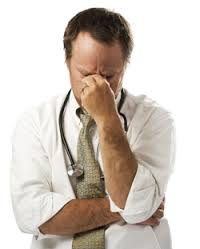NewDay Counseling
If you have a problem with alcohol or some other drug, call a NewDay counselor at 912.201.3605 * 401 Mall Blvd, Ste 101 D, Savannah, Ga * Free Phone Consultations
Opiate Addiction as Medical Concern

If a physician has received training in addiction medicine, it’ll be easy for the doctor to speak with a patient concerning opioid addiction. Some medical professionals, though, find it difficult to talk about opiate addiction as medical concern because of the stigma and the perceived insult. Talking about addiction should be the same as talking about any other medical condition. Actually, doctors have great leverage as they come from a position of authority.
Not enough doctors are shooting straight with patients about addiction to pain killers and other prescription medicines that are often abused. Some doctors might not recognize the signs and symptoms and addiction.
If a physician or nurse suspect opiate addiction, they can confirm their suspicions by using DSM-5 Diagnostic Criteria for Opioid-Use-Disorder. If the patient shows a pattern of use described by at least two on the list of criteria, there is likely an addiction problem — here are a few:
A great deal of time is spent in activities necessary to obtain the opioid, use the opioid, or recover from its effects.
Continued opioid use despite knowledge of having persistent or recurrent physical or psychological problem that is likely to have been caused or exacerbated by the substance.
Craving, or a strong desire or urge to use opioids.
When a physician suspects addiction and convinces the patient to detox from the opiates and seek treatment there’s a good chance the person will recover. If the problem is ignored, it will only get worse. Opiate addicts usually get caught trying to feed their addiction as they take more risks like going to multiple doctors or purchasing opiates from a drug dealer. Many times if the situation between doctor and patient is ignored it builds up until the doctor simply ends the doctor-patient relationship when the patient shows signs of desperation. It’s best to address addiction during the early stages, but this is when doctors are usually reluctant to intervene because they aren’t sure — maybe they only suspect there’s a problem and they don’t want to anger a patient who’s been coming to them for years and is respected in the community.
It can be difficult confronting someone who’s in denial, but if it’s done with care, concern and professionalism it will usually have the intended effect. Giving Suboxone to patients with an opiate addiction and calling it treatment is not enough — the person addicted to opiates needs addiction treatment that entails counseling, education and, most likely, group therapy and long-term recovery management. Addiction is a serious, chronic brain disease, and treating it otherwise is based only in opinion contrary to science and unexamined value-judgments regarding drug addicts that aren’t helpful. All medical professionals should know, in 2015, the facts regarding addiction and recovery.
Pingback: Freedom From Opioid Addiction - NewDay Counseling - Addiction Treatment